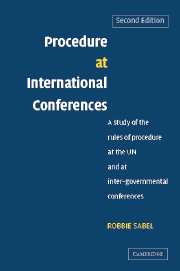 Procedure at International Conferences
Procedure at International Conferences Book contents
- Frontmatter
- Contents
- Preface to the second edition
- List of abbreviations and conference references
- Introduction
- 1 Historical development of rules of procedure of conferences and attempts to establish model rules
- 2 Adoption of rules of procedure
- 3 Rules of procedure and international law
- 4 Invitations, participation and credentials
- 5 Presiding officer and other officers of the conference
- 6 Meetings
- 7 Statements by delegations
- 8 Submission of proposals
- 9 Adjournment and closure of debate
- 10 Amendments
- 11 Withdrawal and reconsideration of motions
- 12 Procedural motions and points of order
- 13 Priorities between different proposals
- 14 Decision taking and method of voting
- 15 Majority required
- 16 Consensus
- 17 Separate votes
- 18 Conduct of voting – interruption of voting and correction of vote
- 19 Languages, records and documents
- 20 Committees
- 21 Suspension and amendment of rules of procedure
- Bibliography
- Index
11 - Withdrawal and reconsideration of motions
Published online by Cambridge University Press: 22 July 2009
- Frontmatter
- Contents
- Preface to the second edition
- List of abbreviations and conference references
- Introduction
- 1 Historical development of rules of procedure of conferences and attempts to establish model rules
- 2 Adoption of rules of procedure
- 3 Rules of procedure and international law
- 4 Invitations, participation and credentials
- 5 Presiding officer and other officers of the conference
- 6 Meetings
- 7 Statements by delegations
- 8 Submission of proposals
- 9 Adjournment and closure of debate
- 10 Amendments
- 11 Withdrawal and reconsideration of motions
- 12 Procedural motions and points of order
- 13 Priorities between different proposals
- 14 Decision taking and method of voting
- 15 Majority required
- 16 Consensus
- 17 Separate votes
- 18 Conduct of voting – interruption of voting and correction of vote
- 19 Languages, records and documents
- 20 Committees
- 21 Suspension and amendment of rules of procedure
- Bibliography
- Index
Summary
Withdrawal of motions
The UNGA rules of procedure state:
Rule 80
A motion may be withdrawn by its proposer at any time before voting on it has commenced, provided that the motion has not been amended. A motion thus withdrawn may be reintroduced by any member.
The UN Model Rules propose:
Rule 47
Withdrawal of proposals and motions
A proposal or a motion may be withdrawn by its sponsor at any time before voting on it has commenced, provided that it has not been amended by decision of the Conference. A proposal or a motion thus withdrawn may be reintroduced by any representative with its original priority, provided he does so promptly and it has not been substantially changed.
Neither the rules of procedure of the Assembly of the League of Nations nor those prepared by the Preparatory Commission of the United Nations contain any rule as to the withdrawal of motions. However, subsequent conferences follow the rules of the UNGA in allowing for withdrawal of motions provided that the motion has not been amended. A motion thus withdrawn may be reintroduced by any delegation.
Withdrawal of a motion adopted by a committee
If a proposal has been adopted by a committee, then it can no longer be withdrawn by its original sponsors.
Withdrawal of part of a motion
The UNGA rule refers to withdrawal of a ‘motion’.
- Type
- Chapter
- Information
- Procedure at International ConferencesA Study of the Rules of Procedure at the UN and at Inter-governmental Conferences, pp. 220 - 244Publisher: Cambridge University PressPrint publication year: 2006


